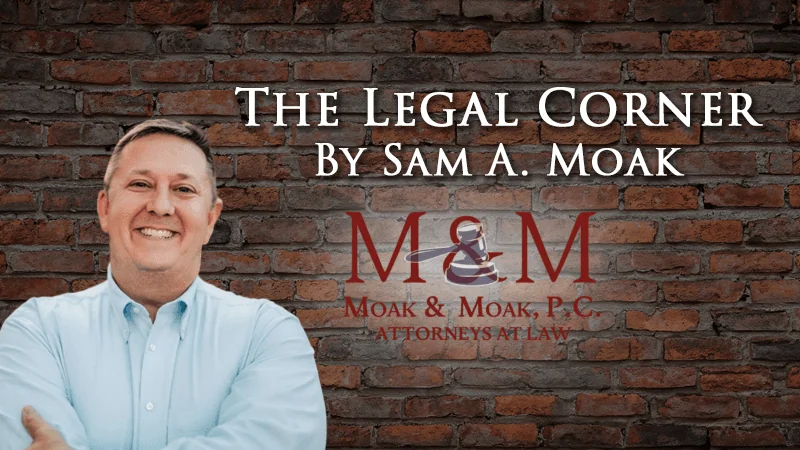The information in this column is not intended as legal advice but to provide a general understanding of the law. Any readers with a legal problem, including those whose questions are addressed here, should consult an attorney for advice on their particular circumstances.
With the influx of people to Texas in the last few years, it occurs to me that many may not be familiar with the system of Probate in Texas. Probate is one of the most misunderstood words in the legal language; probate is simply the administration of a deceased person’s property or transfer of their assets. However, because probate is misunderstood, many take advantage of families facing probate. Estate administration is the management and settlement of a deceased person’s estate by a personal representative approved by the court. Estate administration does not require a will. Probate can be the formal process of administering a person’s estate when they have a will, but there are other methods I will discuss in this column.
Probate may not be necessary when the decedent’s estate is so small that no action is necessary to distribute the property to the beneficiaries or heirs. However, probate is required in most other circumstances.
Estate administration involves the following steps:
1. Collection of the decedent’s assets;
2. Payment of debts and claims against the estate;
3. Payment of estate taxes, if any;
4. Determination of heirs if the decedent died without a will; and
5. Distribution of the remainder of the estate to those entitled to it.
In Texas, there are several different methods of administering an estate, some of the more common of which are discussed below.
Dying without a will:
Many people may assume that if they are married and die without a will in Texas, their surviving spouse will inherit their entire estate. This is not always the case. How their property is divided depends on whether it is characterized as community property or separate property. Whether the children of the deceased person are also children of their spouse comes into the distribution as well. This often results in a lawsuit to determine the heirship and appointment of an Administrator. Dying without a will is the least desired result.
Standard Probate of Wills:
Whether you have a handwritten or typewritten will, its validity must be proved in court. This procedure is known as probate, and it generally must take place within four years after death.
A will that is not proved in court is denied probate. In this event, the decedent’s property passes to his or her heirs as if he or she died without a will. Again, this further emphasizes how important it is to execute a will that meets all legal requirements so that the property will pass as the decedent wishes. After proving the validity of a will, the next step in the probate process is the administration of the estate.
Independent Administration:
Texas is one of the states that provides for independent administration - administration free of court supervision. This means that after an independent executor or administrator is approved and an inventory of estate assets is filed with the court, the executor or administrator can simply take care of the administration of the estate without any further court involvement or supervision. The independent executor or administrator is free to settle with creditors, set aside the homestead and other exempt property, manage the property of the estate, sell assets for payment of debts or taxes, and distribute the remaining estate to those entitled to it. Thus, independent administration avoids the costs and delays associated with a court-supervised estate administration in which the executor or administrator must seek court approval before performing any of these acts.
Muniment of Title:
If there is no need for the appointment of an executor or administrator and the only reason for probating a will is to clear title to the property, a will can be admitted to probate as a muniment of title. Under this procedure, there is no executor or administrator appointed. It is a somewhat more simplified method of probating a will than the traditional formal administration. It is generally used only when there are no debts of the estate to be paid and no other actions that require the appointment of an executor or administrator.
Small Estate Affidavit:
If the decedent died intestate, without a will, then his estate may be resolved with a small estate affidavit. If the value of the estate, excluding the homestead, exempt personal property, and non-probate assets, does not exceed $50,000.00, no formal administration is necessary if the heirs file an affidavit with the court showing that they are entitled to receive the property of the estate.
The small estate affidavit is not necessarily limited to small estates and may be a useful alternative to a formal administration in certain estates where, for example, the residence and non-probate assets comprise the majority of the estate and the remaining assets are valued at less than $50,000.00. Check with your estate planning or probate attorney to see if this is appropriate in your circumstances.
Informal Family Settlements:
Informal family settlements are permissible where the estate is small and consists only of personal property, such as personal effects and household furnishings, but generally not where the estate includes real estate, bank accounts, stocks, and bonds. If a motor vehicle is involved, a new certificate of title may be applied for by filing an affidavit of heirship with the Texas Department of Public Safety.
As always, check with your attorney to decide which method of estate administration is right in your particular circumstance. It could save you time and money.
Sam A. Moak is an attorney with the Huntsville law firm of Moak & Moak, P.C. He is licensed to practice in all fields of law by the Supreme Court of Texas, is a Member of the State Bar College, and is a member of the Real Estate, Probate and Trust Law Section of the State Bar of Texas. www.moakandmoak.com


